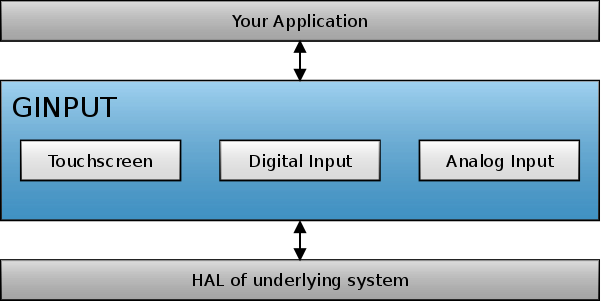Difference between revisions of "GINPUT"
(→API reference) |
(→Digital input) |
||
| Line 16: | Line 16: | ||
== Digital input == | == Digital input == | ||
Also known as the ''Toggle'' driver. This driver can be used to interface common digital inputs (GPIOs). Mostly this driver is used to attach hardware buttons to a [[GWIN]] [[Widgets|widget]]. | Also known as the ''Toggle'' driver. This driver can be used to interface common digital inputs (GPIOs). Mostly this driver is used to attach hardware buttons to a [[GWIN]] [[Widgets|widget]]. | ||
| − | |||
| − | |||
== Analog input == | == Analog input == | ||
Revision as of 20:15, 16 April 2016
GINPUT is a powerful module which provides an easy way to interface different hardware peripherals such as touchscreens to the rest of the library. It provides everything which these peripherals need in order to operate properly such as calibration routines for the touchscreens.
Contents
API reference
The API reference of the GINPUT module can be found here.
Touchscreen
A touchscreen can be interfaced very easily through the GINPUT module. It doesn't matter if it is a resistive, capacitive or any other touchscreen technology.
Board file
The GINPUT module requires a board file for each driver instance. A board file template and corresponding examples can be found under /drivers/ginput/touch/xxx/.
Calibration
Digital input
Also known as the Toggle driver. This driver can be used to interface common digital inputs (GPIOs). Mostly this driver is used to attach hardware buttons to a GWIN widget.
Analog input
Also known as the Dial driver. This driver can be used to interface slow analog inputs. Mostly this driver is used to attach an analog peripheral such as a potentiometer or a sensor to a GWIN widget. It can also be used on digital inputs that emulate a graduated ratio output such as a digital "click" wheel (rotary encoder).
ToDo
Keyboard
ToDo.
